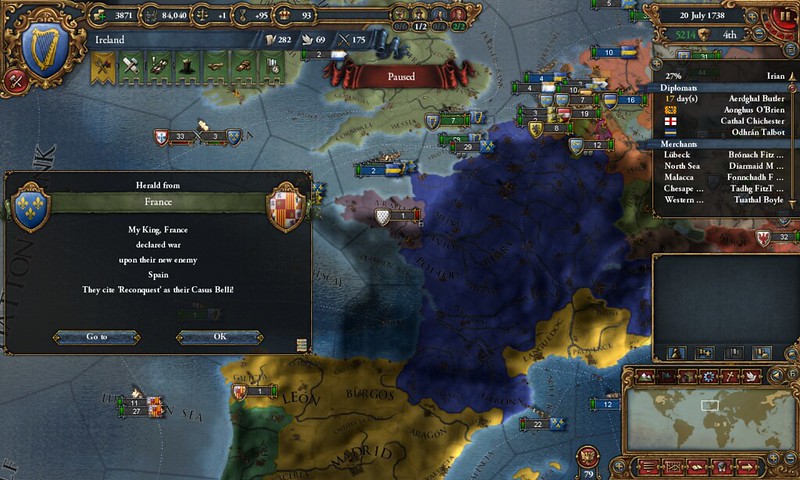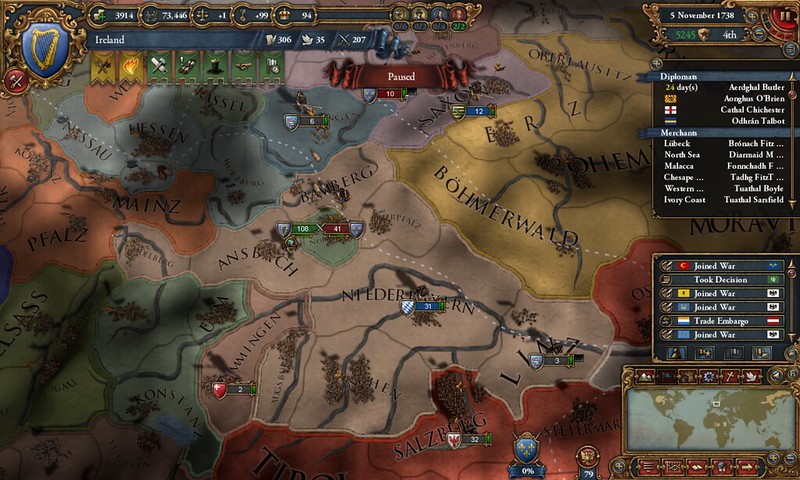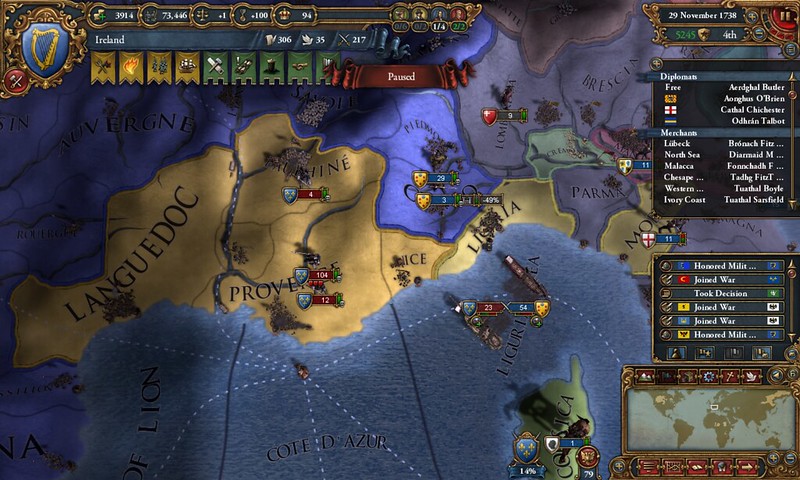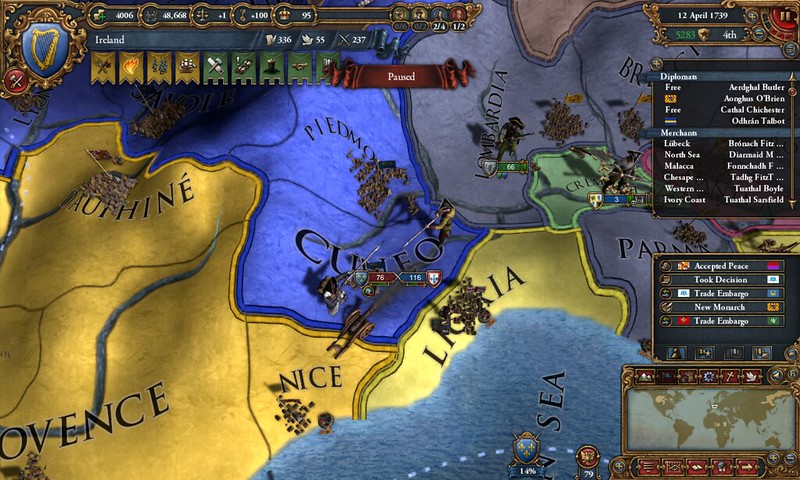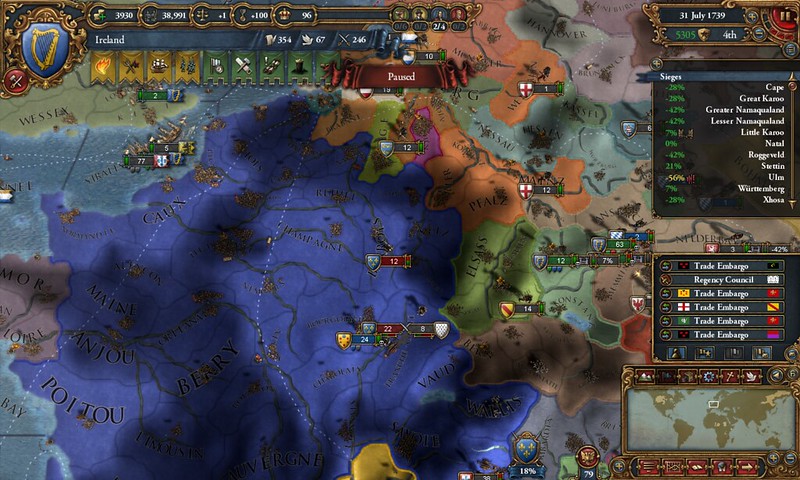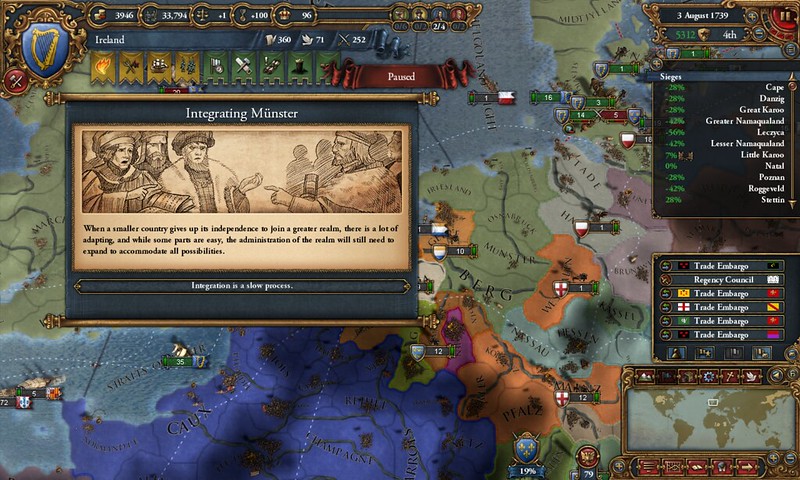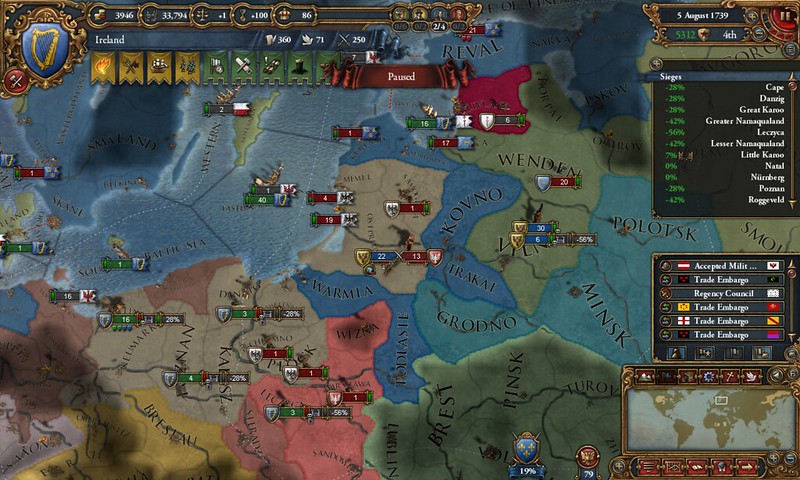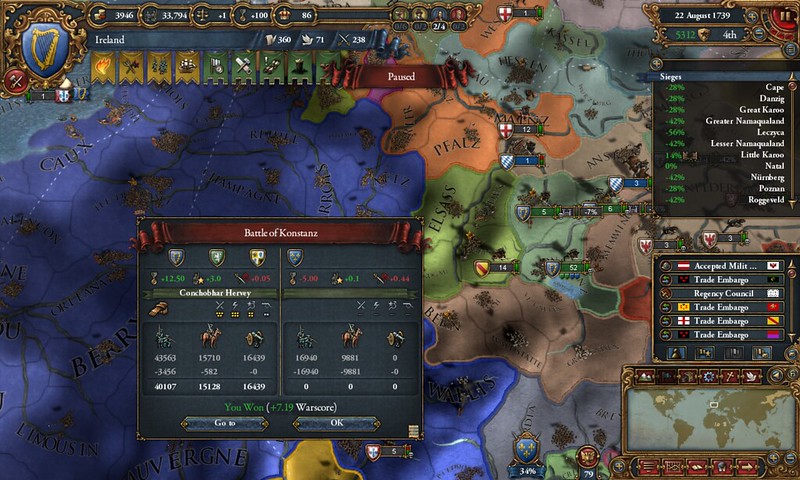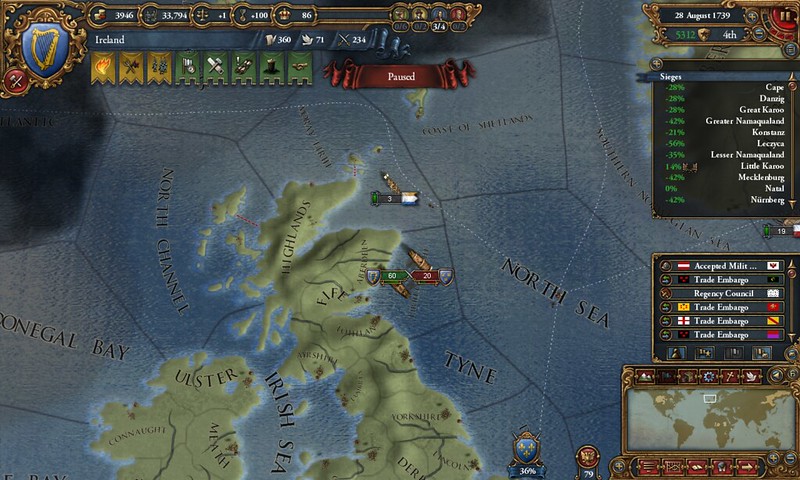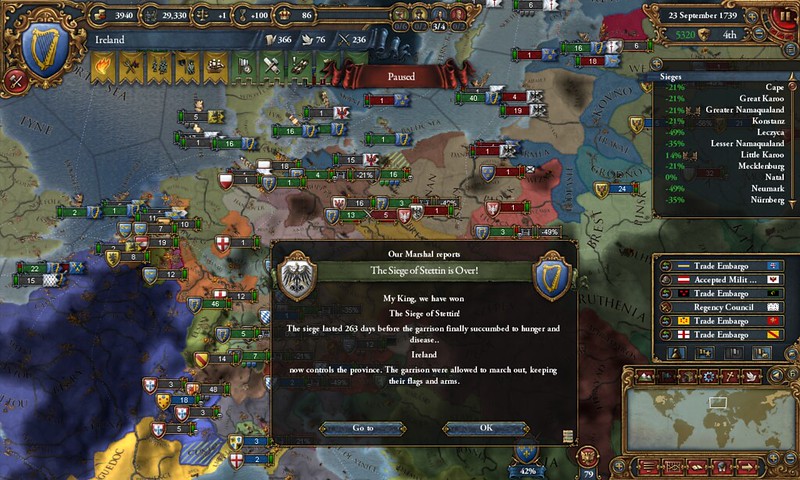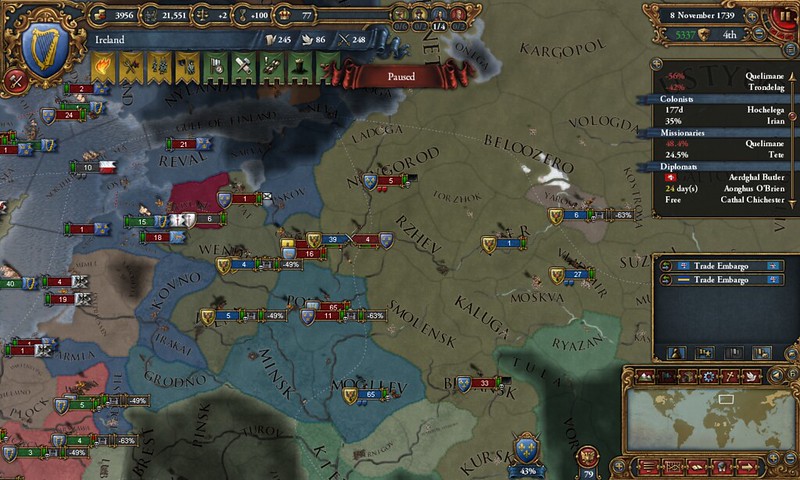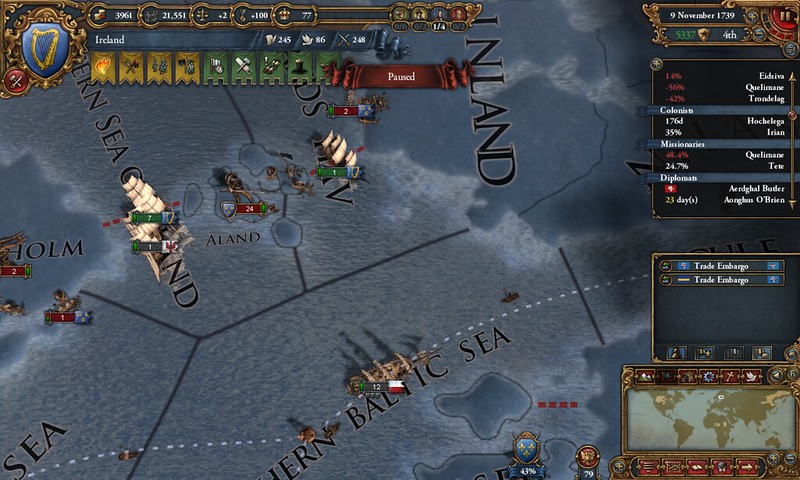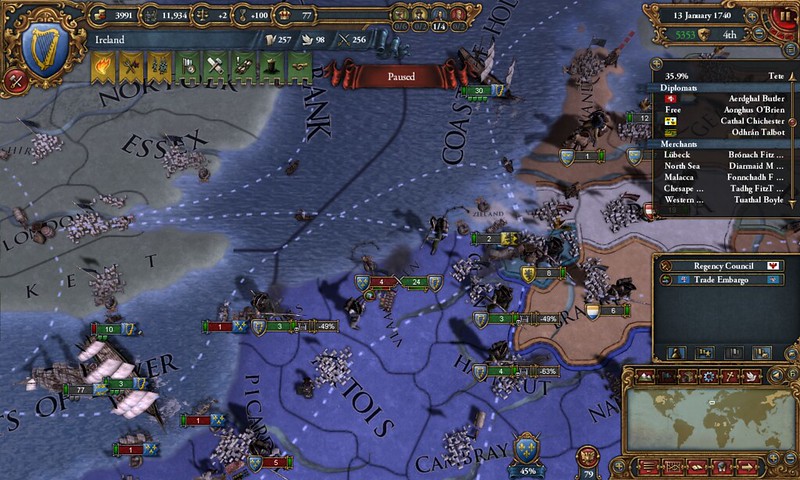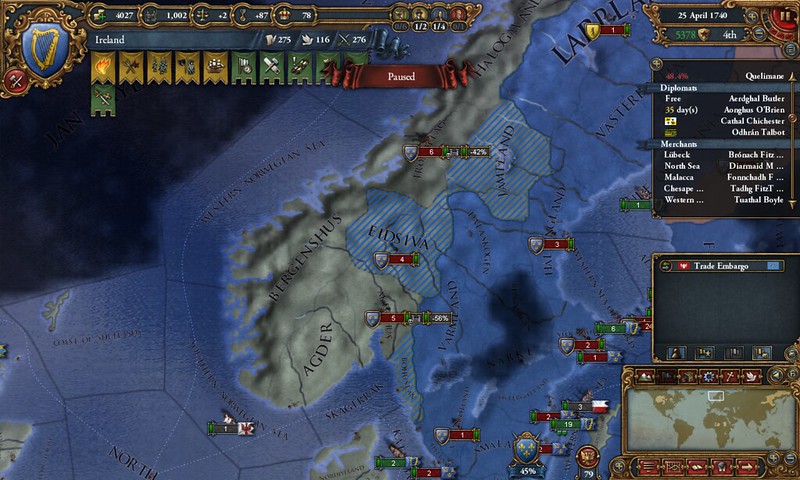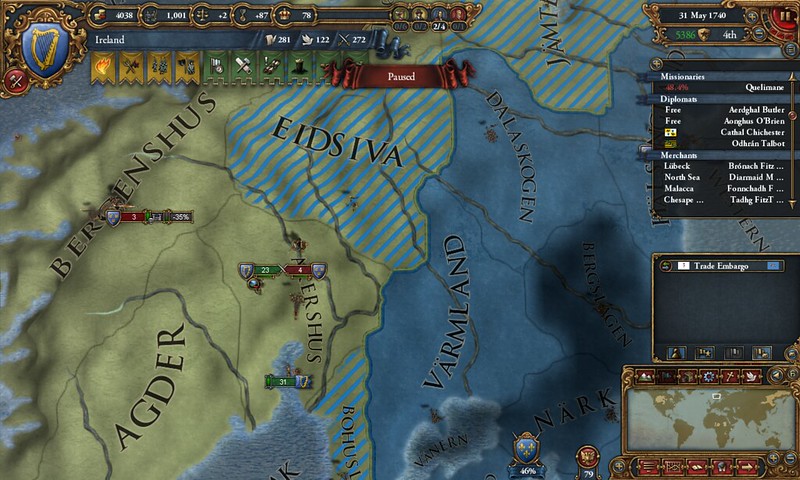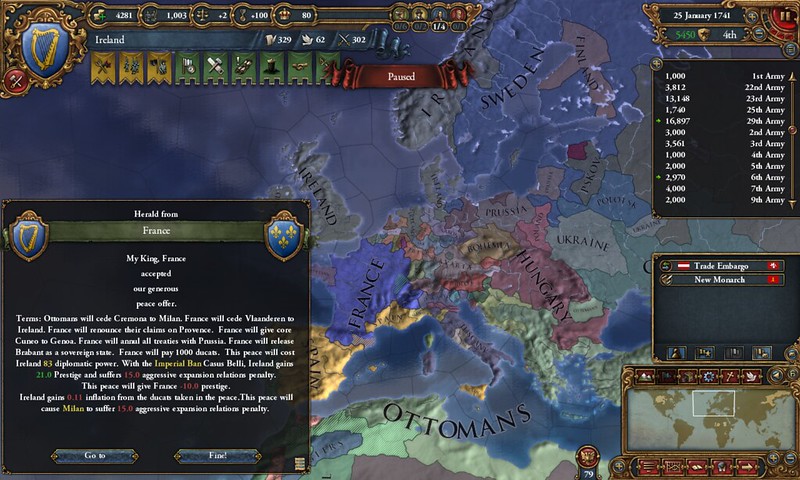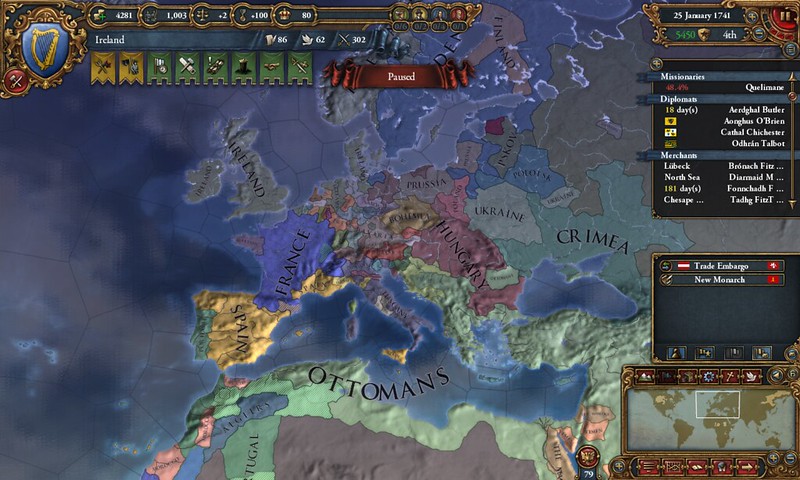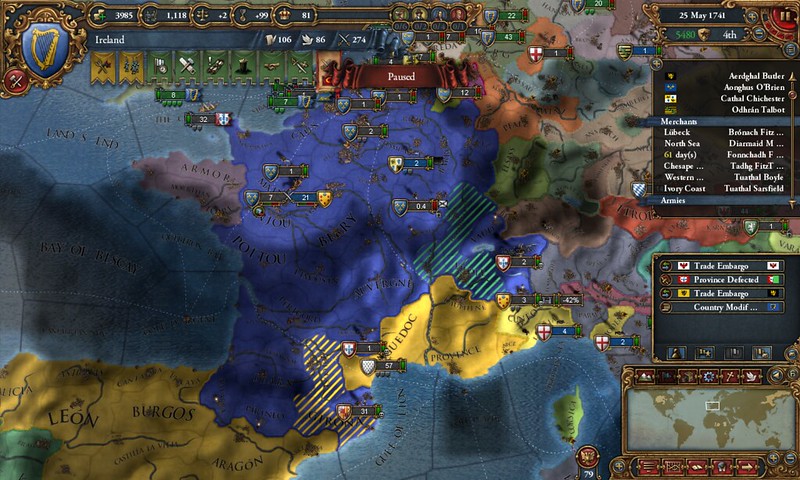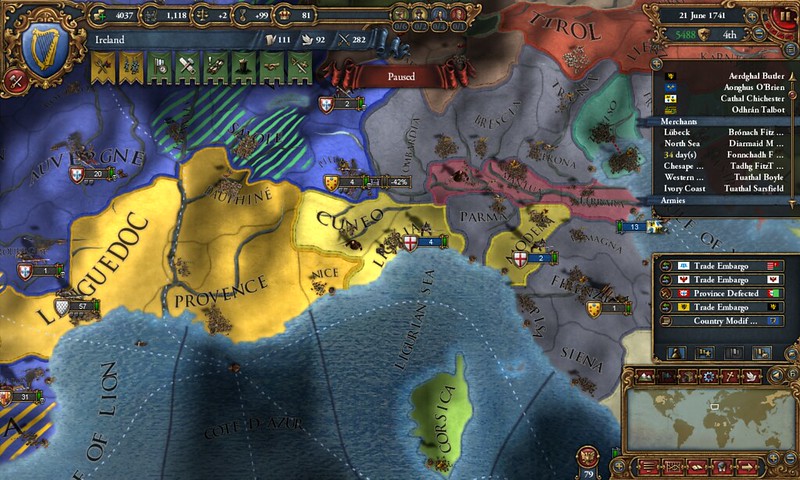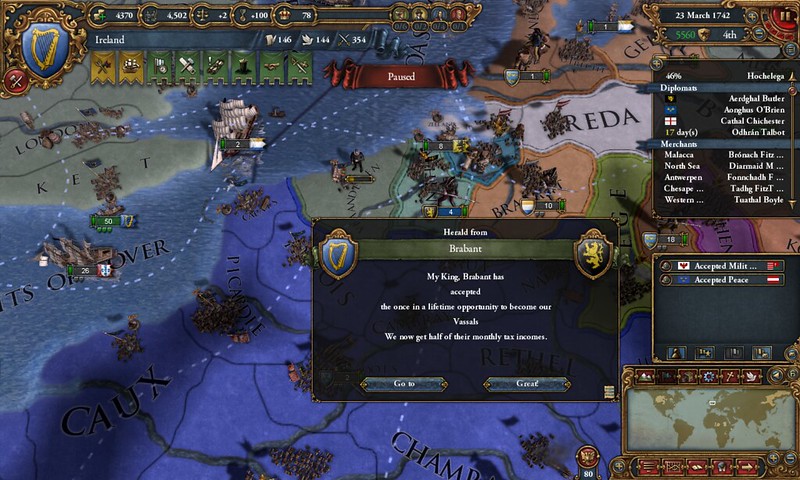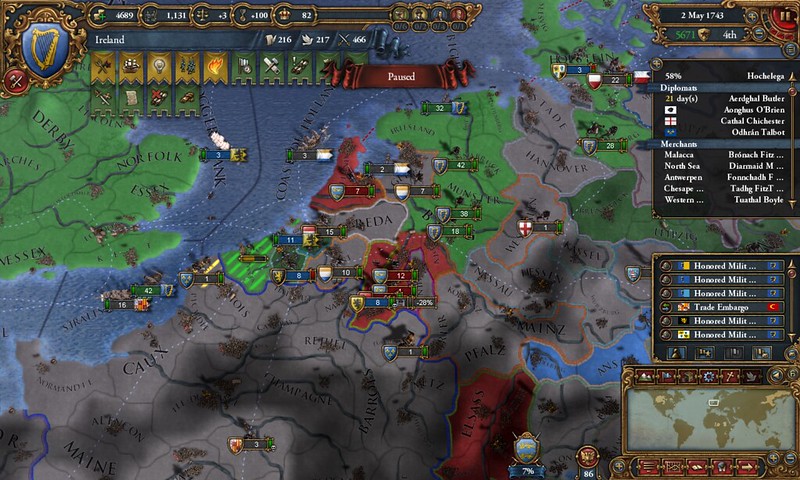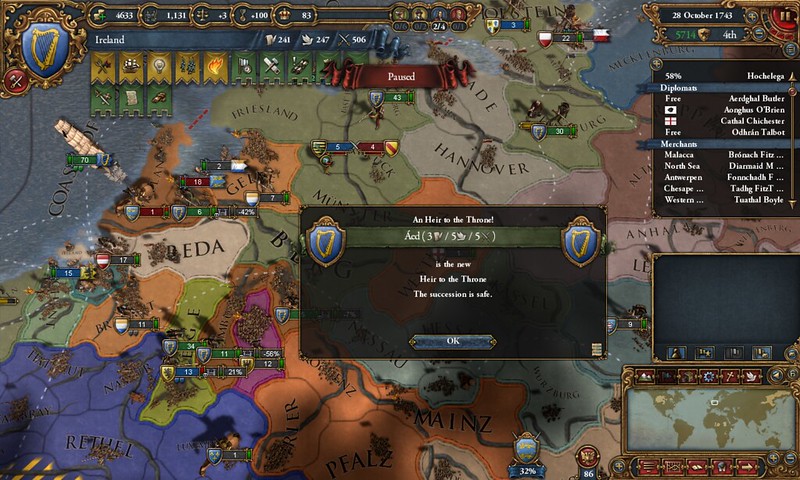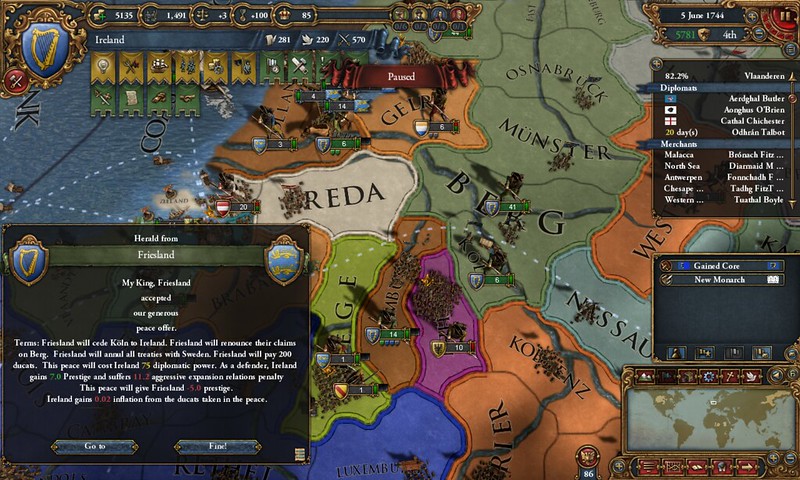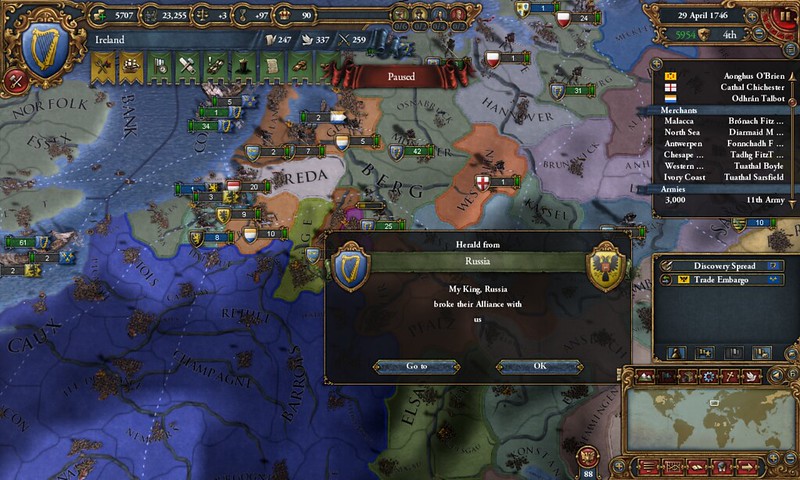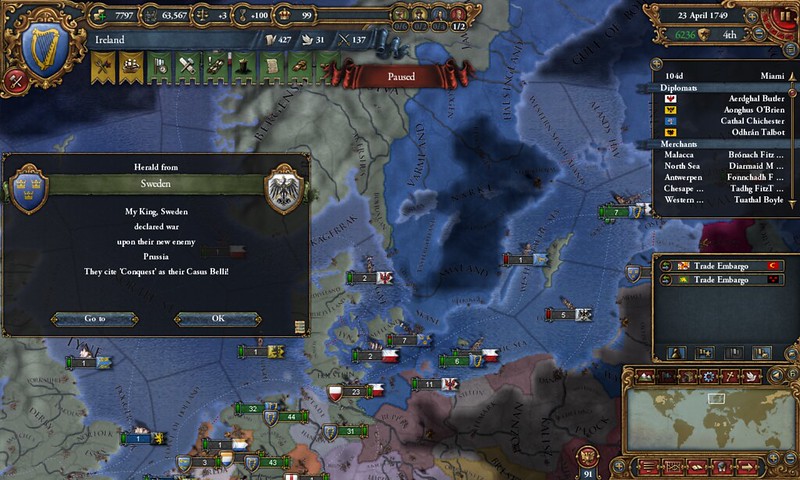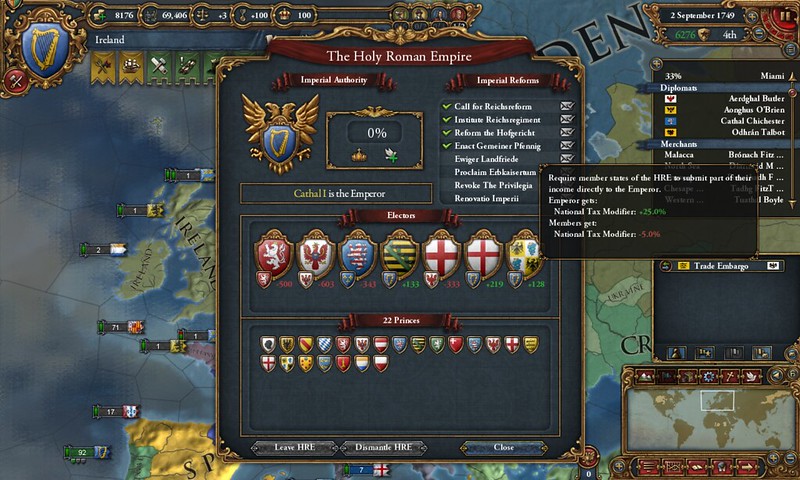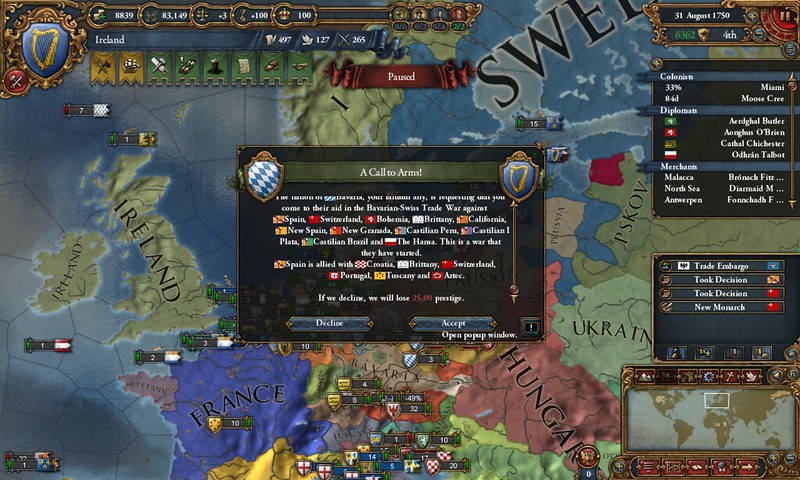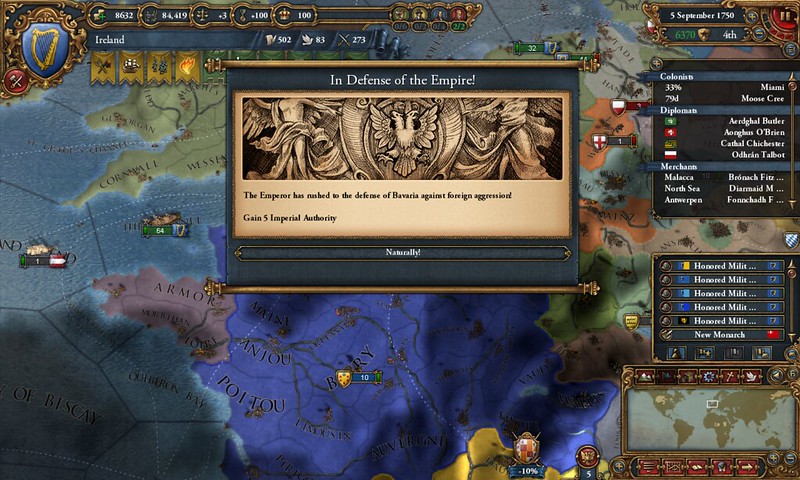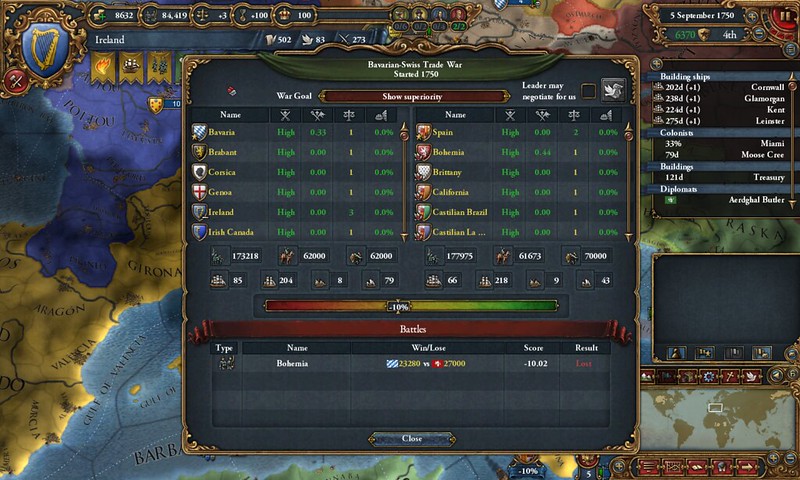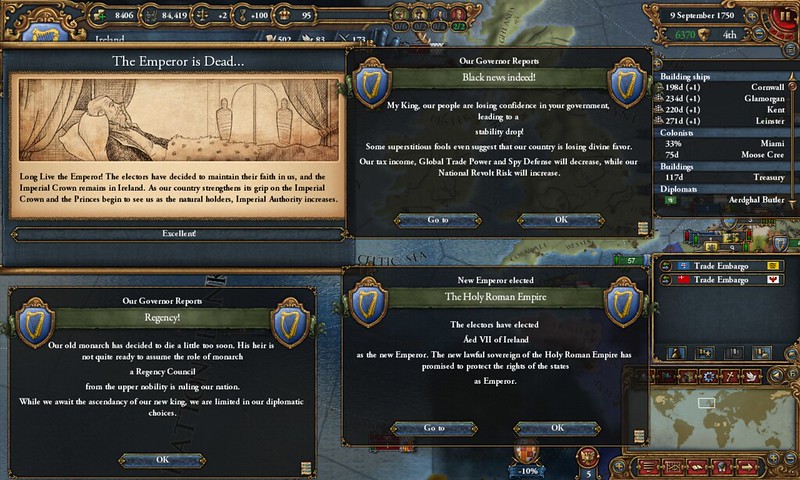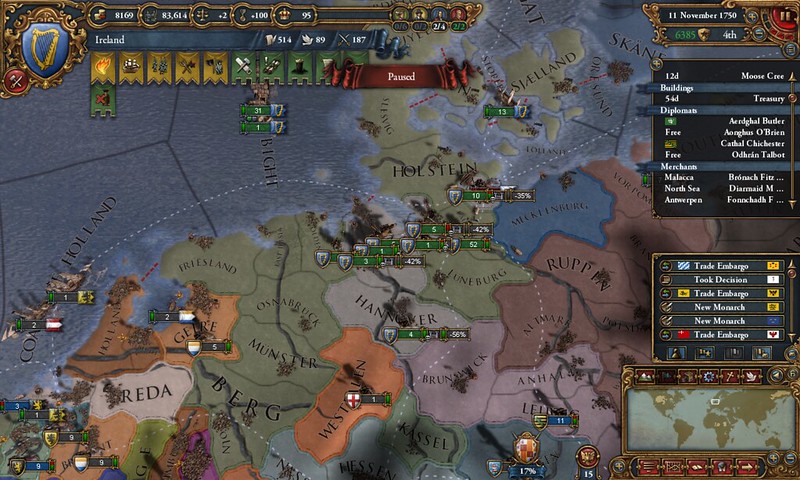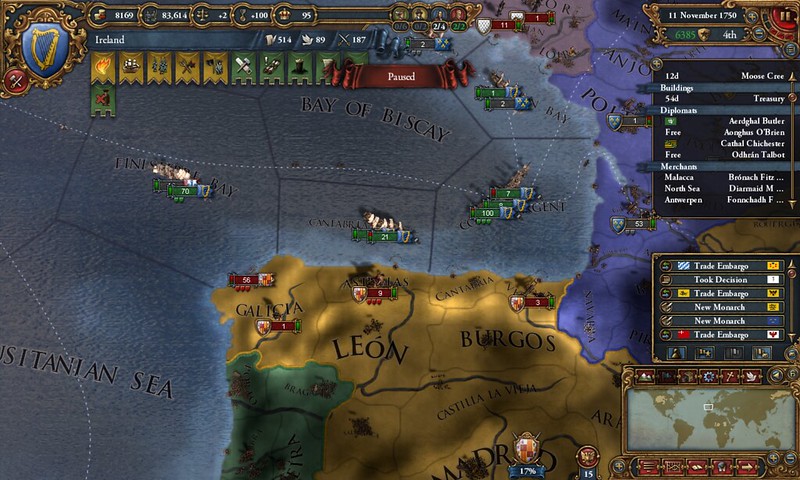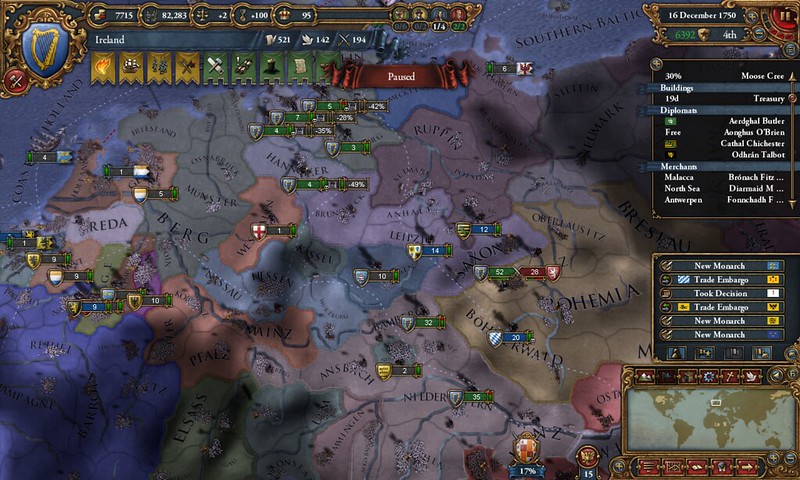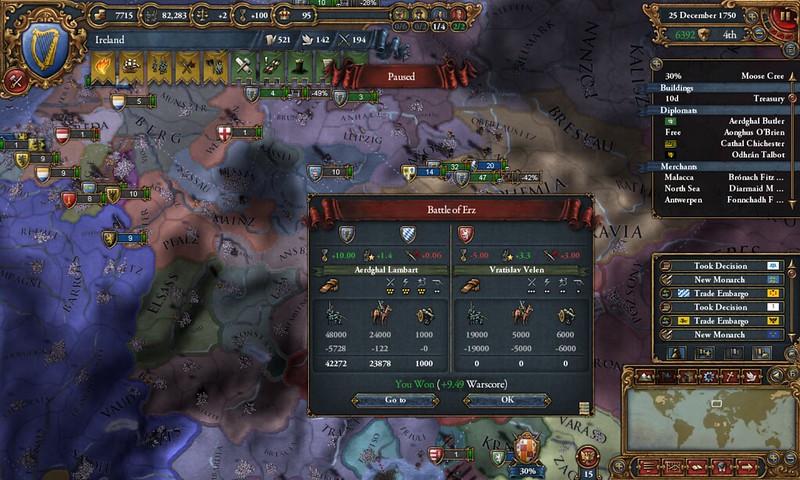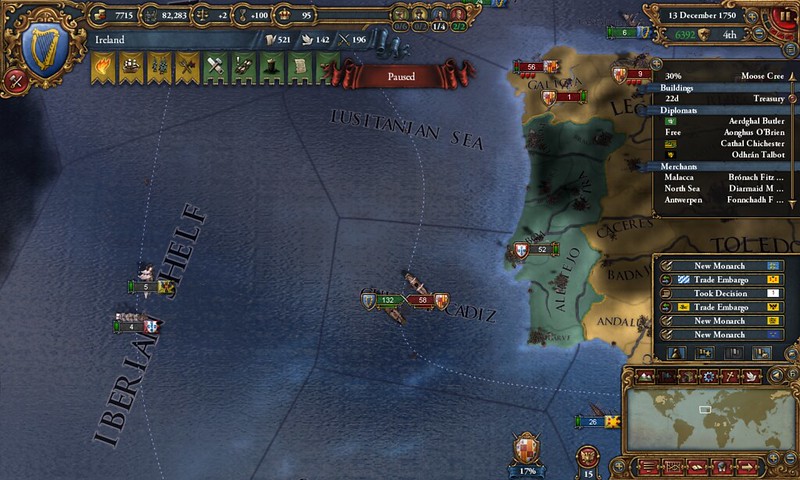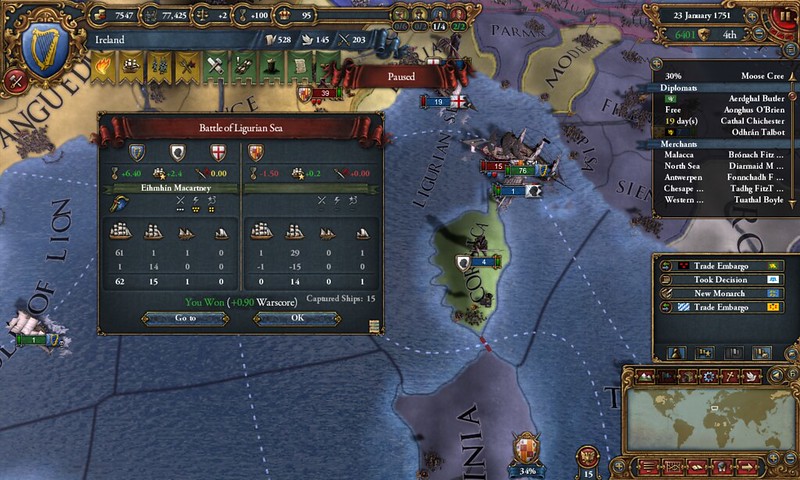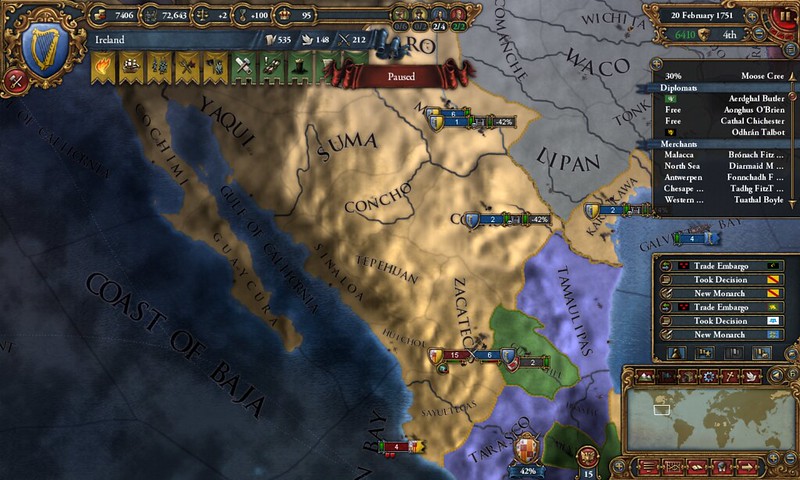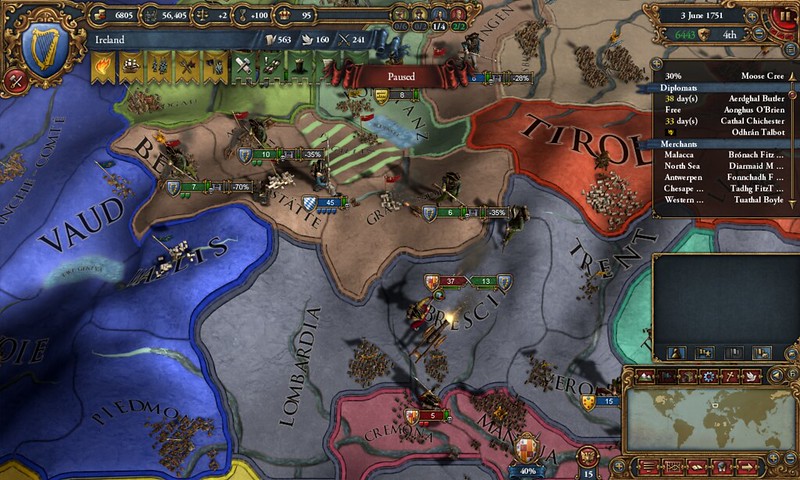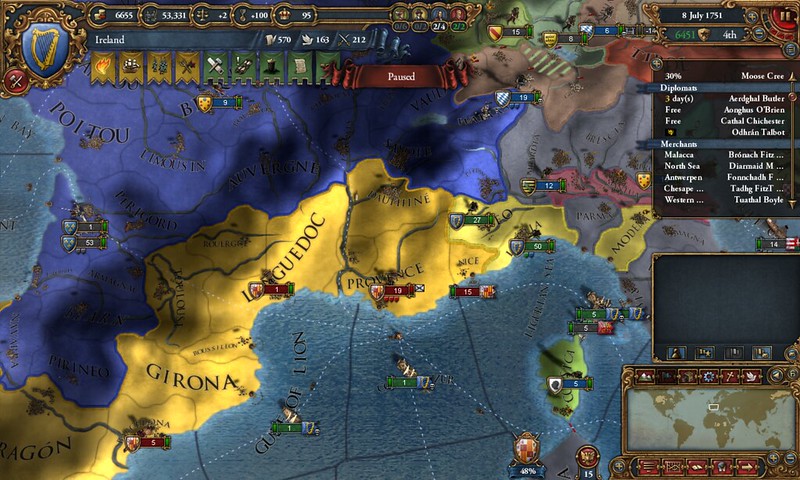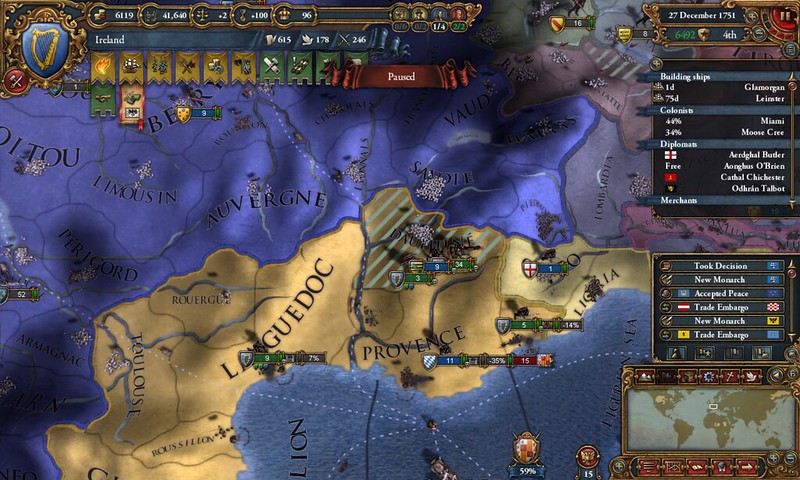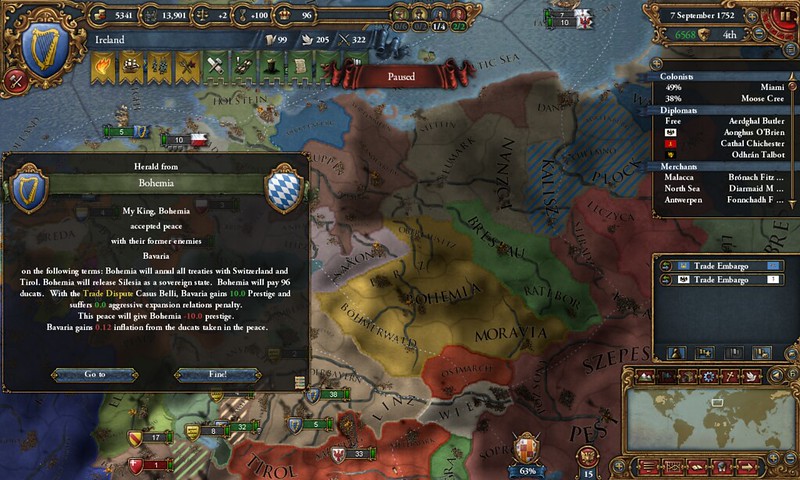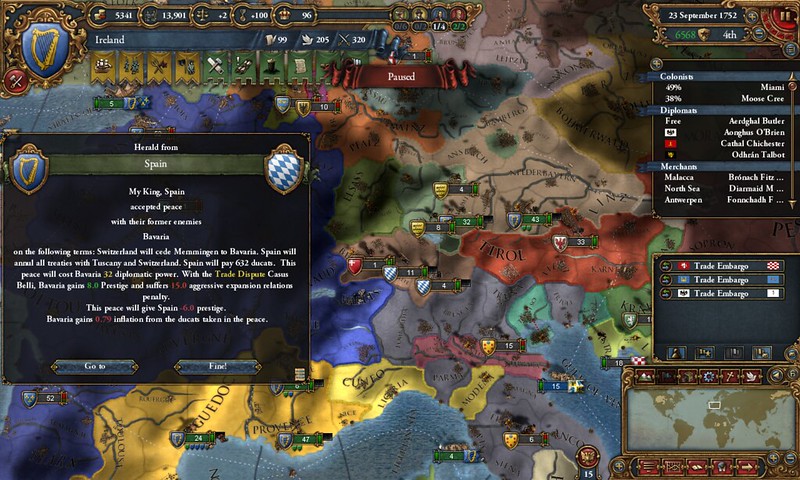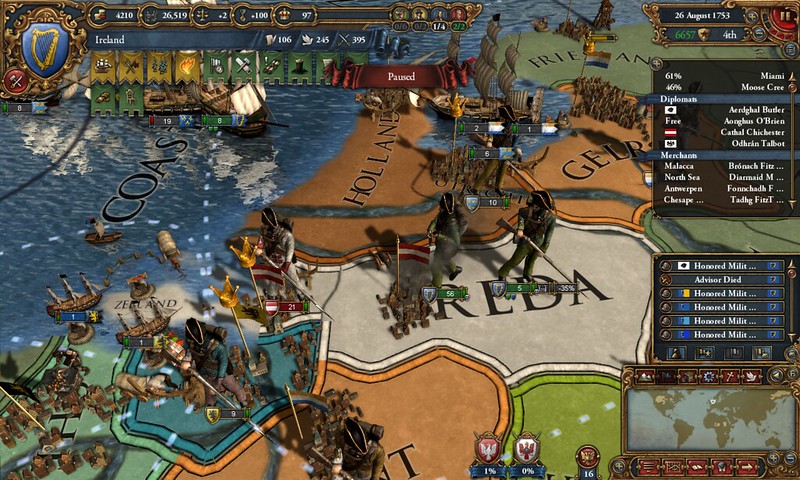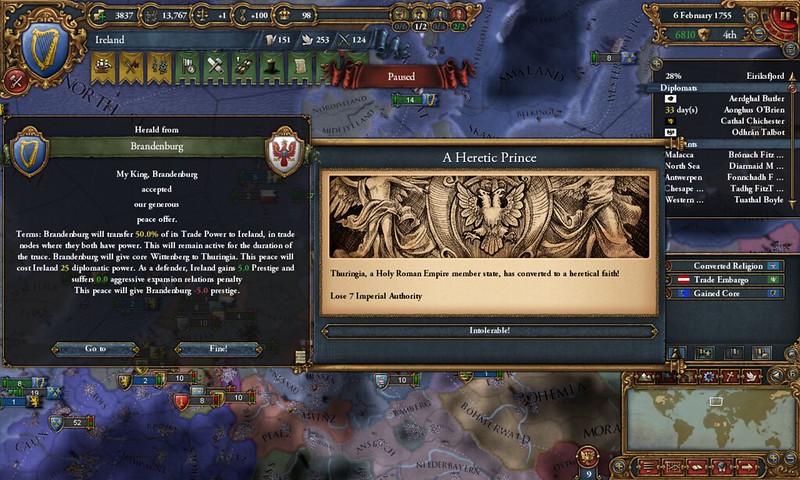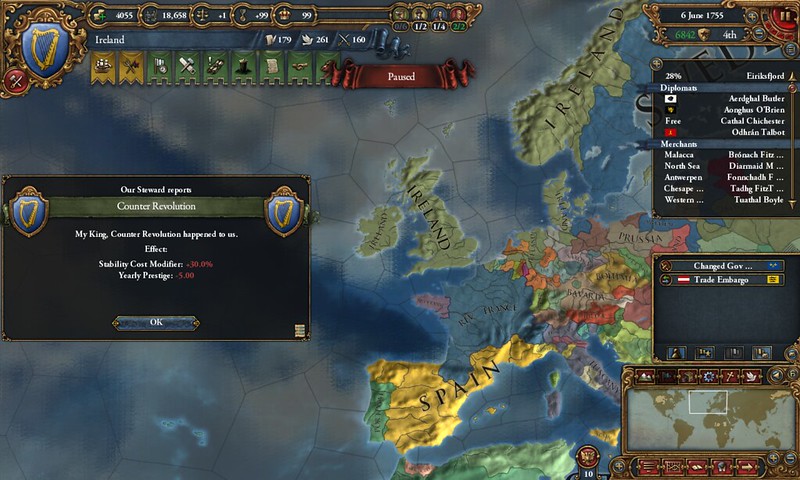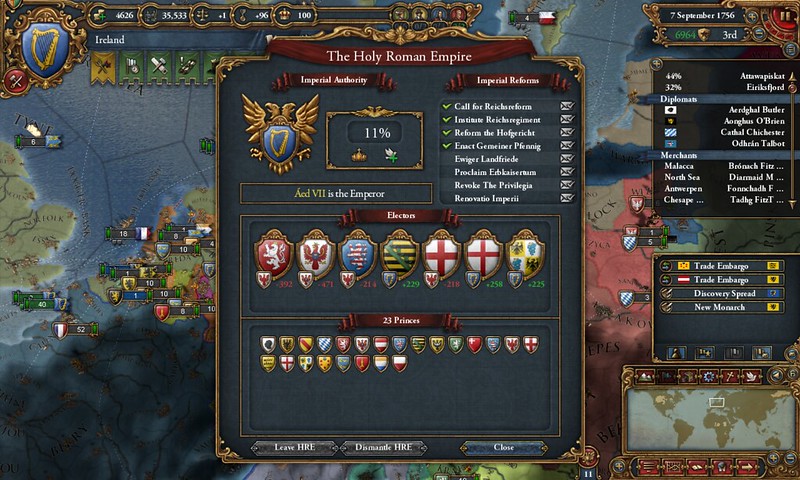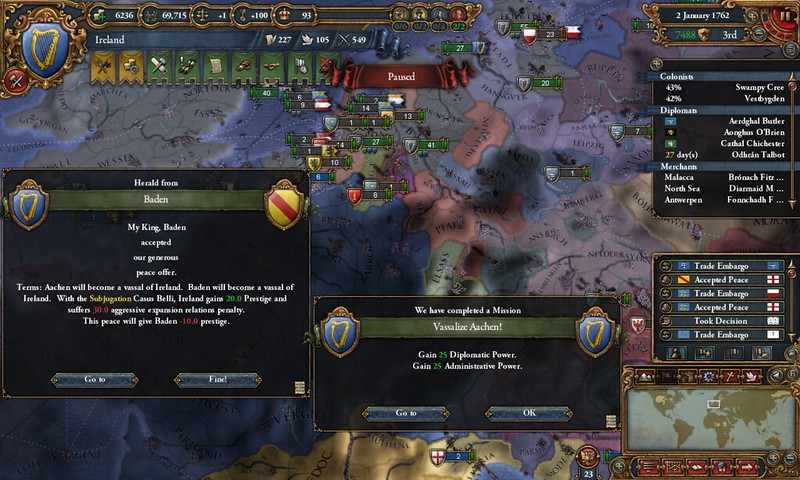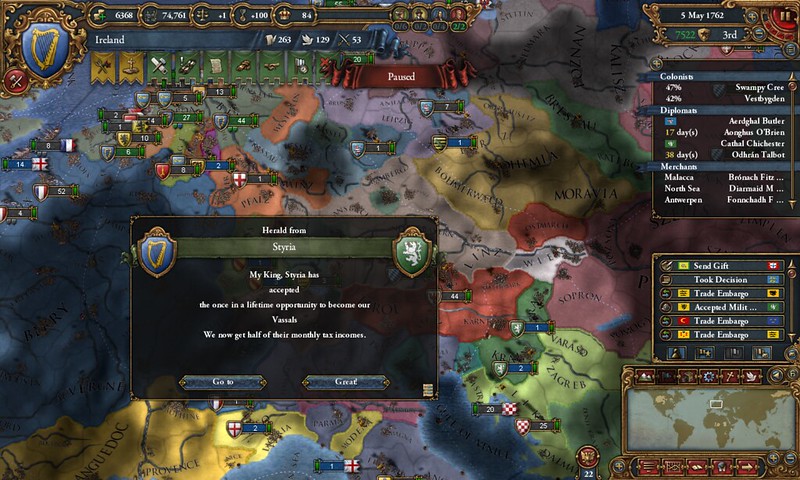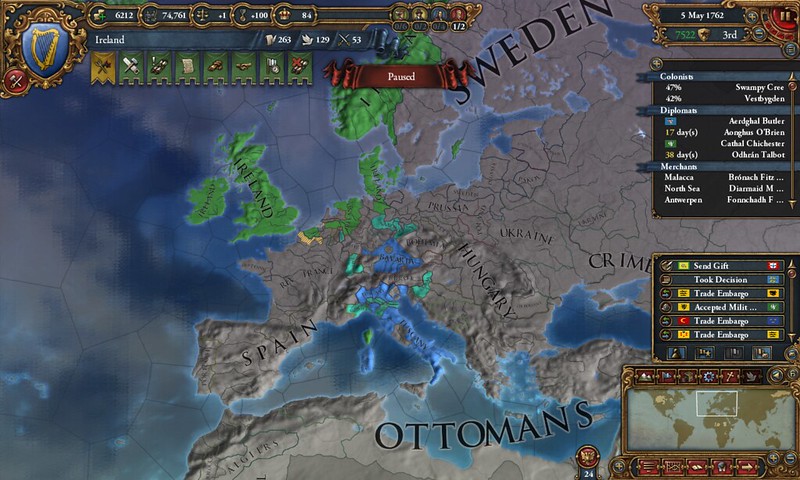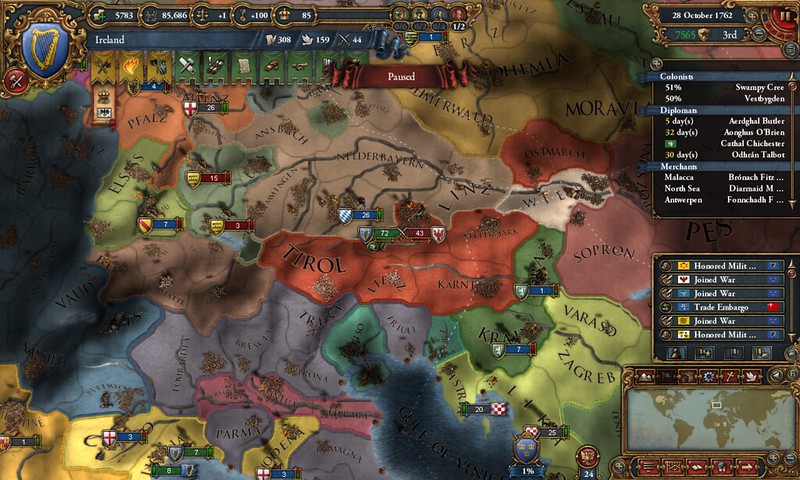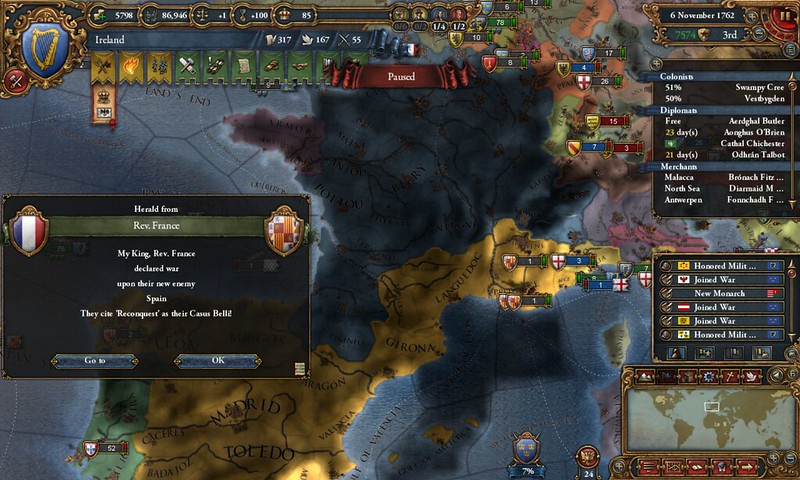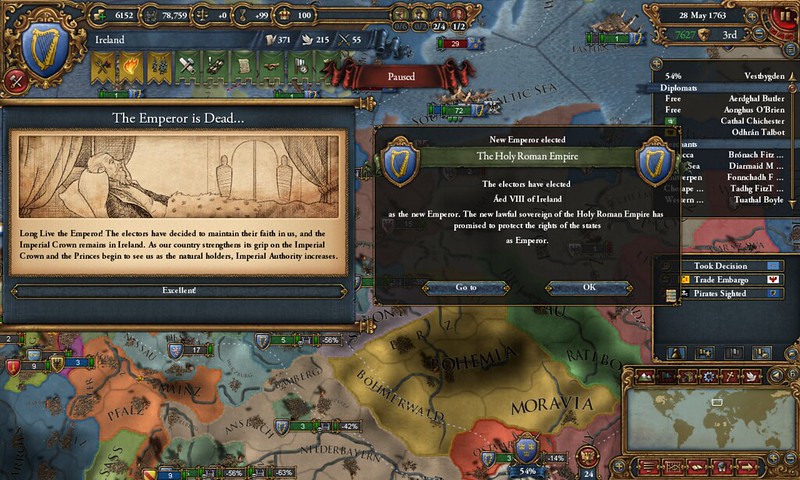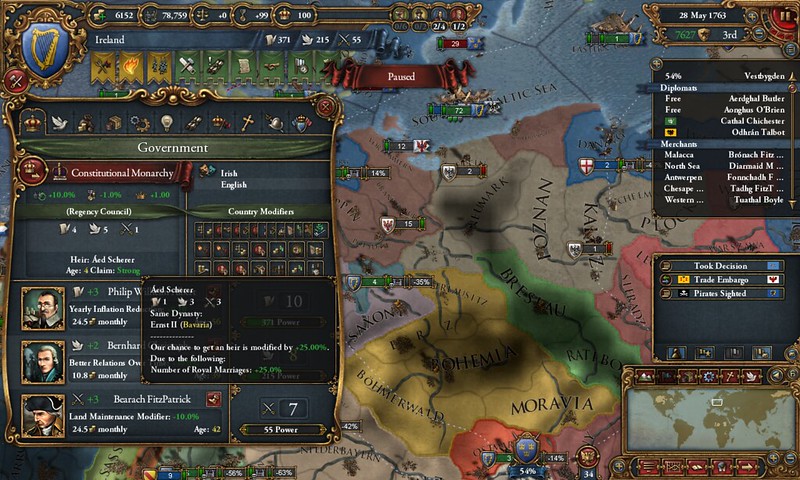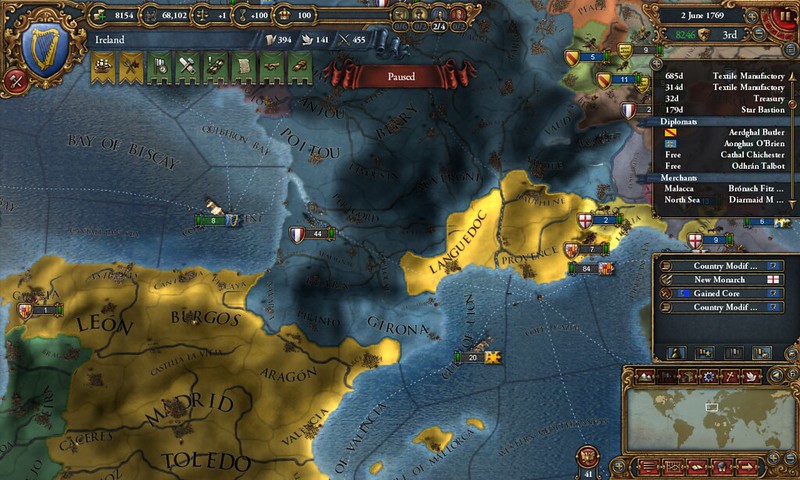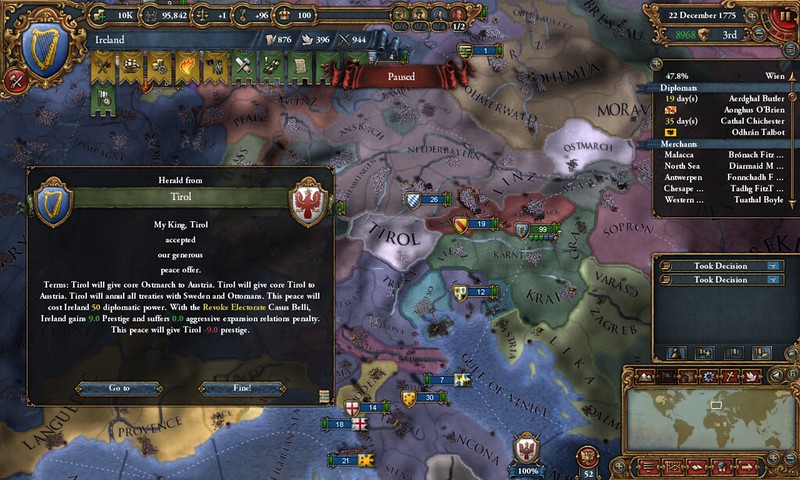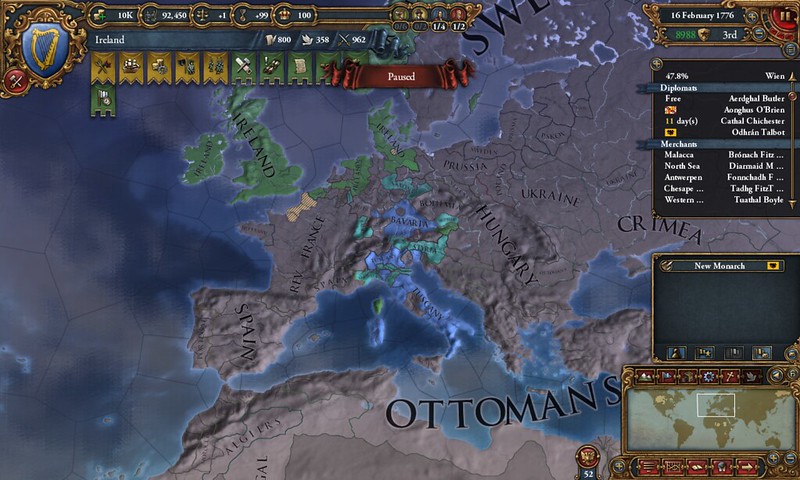Rise of the High King 2: Return of the King (Munster AAR)
- Thread starter macd21
- Start date
-
We have updated our Community Code of Conduct. Please read through the new rules for the forum that are an integral part of Paradox Interactive’s User Agreement.
You are using an out of date browser. It may not display this or other websites correctly.
You should upgrade or use an alternative browser.
You should upgrade or use an alternative browser.
Well, I'll be continuing with the AAR. Unfortunately the patch rendered the game non-Ironman for some reason and I can't change it back. Still, I don't think I was ever going to get a WC achievement, so I'm not bothered. Should have the next chapter up soon.
Chapter 37: The Provence War
I enjoyed a decade of peace, conserving my manpower and building up a nice little war fund. Our Russian allies were unfortunately defeated, but this was of little concern. Cleves was integrated, while negotiations to annex Münster and Lüneburg were will under way. The loss of the American colonies meant that Styria was no longer interested in becoming my vassal, but Corsica agreed to become a subject state. Two more provinces were seized in east Africa, increasing our control of the ivory trade. Tragically, Prince Conchobhar died - hopefully the next heir would have more potential!Finally, however, the opportunity I had been waiting for arrived.
France was at war with Spain, Portugal and Tuscany. The French military was strong enough that the odds were fairly even... unless I was to weigh in on one side or another. It was finally time for France to learn some humility.
I decided to declare war on Prussia rather than attack France directly. Prussia held a number of Imperial provinces, giving me a cassus belli. They would hopefully be crushed between my forces and those of Russia, allowing me to seize the wargoal while the French struggled with Spain and Portugal.
I quickly realised, however, that this may have been a mistake. Attacking Prussia drew in their other allies and, troublingly, Sweden, the Protestant defender of the faith. France also called upon the Ottomans to help them. Had I bitten off more than I could chew?
As my forces marched east, I noticed a Swedish army that had been left stationed in Wurttemberg after some the Bavarian-Thuringian war. I quickly diverted my invasion force shouth, crushing them utterly. Not a bad start.
Further south, I noticed that the Franco-Iberian conflict seemed to be concentrated in the Provence region. I diverted a quarter of my troops north to Prussia, while the rest headed to Tuscany.
I hoped to combine my forces with those of Spain, Portugal and Tuscany, so we could crush the main French army and guarantee our victory. Some of my troops remained in Wurttemberg to lay siege to their cities and I skirmished with their forces briefly before arriving in Italy. To the east the Russians clashed with our other enemies, while western Prussia lay besieged by our forces.
The French finally engaged the Iberian army in Cuneo. My troops rushed to reinforce the Iberians and together we slaughtered the enemy. 53,000 Frenchmen were killed or captured, to only 7,000 casualties on our side.
I then convinced the Iberians to help my forces storm the local garrison force, rather than engage in a lengthy siege. Cuneo was mine, the first French province to fall.
The next few months saw a number of skirmishes fought between my forces and those of Sweden and Wurttemberg, but for the most part I concentrated on sieges. I raised a mercenary army in Denmark to increase the strength of my forces in the region, allowing me to lay siege to the Swedish holding of Mecklenburg. The Russians struggled to deal with the multitude of enemies besetting them. A large Ottoman force rampaged through their southern provinces, while the Polish and Ukrainian troops fought them to a standstill in the east. The process of annexing Münster was completed, adding a swath of German territory to my realm. The French struggled to regroup, suffering more losses as Tuscan and Breton armies wandered across their lands and the Spanish and Portuguese lay siege to their southern cities.
Finally, at the battle of Konstanz, possibly the last intact French army was defeated by a joint Styrian, Milanese and Irish army.
While my forces had been triumphant on land, on the waves my ships had been forced to concentrate their efforts in the Baltic, pinning the Prussian fleet in port and clashing with the Swedes. The remnants of the Swedish fleet managed to escape to the Northern Sea, but was finally wiped out off the coast of Scotland.
This allowed me to divert some of my ships to blockading the French coast. The Spanish and Portuguese had already destroyed most of the French navy, allowing my merchant ships to dominate the cross-Atlantic trade. Despite the increased cost of my military maintenance I was now making more money per month than I had before the war.
Stettin finally fell. The writing was on the wall.
Lüneburg was integrated, granting me yet another province in the region. Looking east again I realised that the Russians weren't doing so well. I marched on Poland in an effort to reduce the pressure on the Tzar's forces.
I was lucky enough to trap 24 Swedish regiments on the Åland islands as they tried to cross the Baltic to the Russian front. One less thing to worry about...
Meanwhile, on the western front, my troops moved into northeastern France. The enemy made a few futile efforts to drive out the besieging forces, but were easily crushed.
I secured peace agreements with Poland and Pskov, easing the pressure on the Russians. The only front upon which I was suffering set backs was in Norway, which lay undefended.
With the situation on the western and eastern fronts in hand, I diverted an army to drive back the Swedes. Moving along the coast, they easily defeated the small besieging forces they had left to take my provinces.
More and more French cities fell to my forces. Finally, I sent them my demands.
Both of my Italian vassals had been strengthened, while I had taken another step towards linking my island holdings with the empire. Iberian troops continued to rampage across France. The once mighty French kingdom was a shadow of its former strength. And as my rivals continued to fight amongst themselves, Irish merchants monopolised the Atlantic trade. While my manpower reserves were depleted, there was no one in Europe in a position to strike at me. Ireland stood tall, the most powerful country in Europe... for now.
Wow, it sure did deplete your manpower! I didn't notice until you said it, but 84k down to 1k! 
Good job strategically weakening the other great powers. It's probably a weakness - or passiveness - on my part that I am generally to gun-shy to do it on my own. But obviously it yields great results. One of the bonuses of the new coalition system, I suppose.
Good job strategically weakening the other great powers. It's probably a weakness - or passiveness - on my part that I am generally to gun-shy to do it on my own. But obviously it yields great results. One of the bonuses of the new coalition system, I suppose.
Wow, it sure did deplete your manpower! I didn't notice until you said it, but 84k down to 1k!
Good job strategically weakening the other great powers. It's probably a weakness - or passiveness - on my part that I am generally to gun-shy to do it on my own. But obviously it yields great results. One of the bonuses of the new coalition system, I suppose.
I think it's a lot harder to pull off with the new coalition system, actually. If you try to cripple a major power too much then you'll end up fighting a coalition (with the major power leading it). The AI seems to rarely expand so aggressively that it faces a coalition (and those that do form don't last very long).
Chapter 38: The Diplomatic Front
As my forces returned home I sat back and relaxed. It would take a while for my manpower to recover, but there were no serious threats to my position. I was not without problems, however. Annexing Münster and Lüneburg had angered the rest of the Holy Roman Empire. Though my control of the Imperial throne was not at risk, the other member states were not inclined to vote for another reform. I began a diplomatic offensive, assuring the other princes of the empire that I had no intention to taking their lands...The Iberian and Italian armies continued to invade France. I was most curious to see what kind of territorial concessions the French would have to make in exchange for peace.
The war had increased the strength of both of my Italian vassals. Each held three provinces and might actually prove to be useful allies, rather than just Imperial votes in my pocket. They could now afford small stacks of troops and squadrons of ships.
Newly released Brabant agreed to be my vassal - a wise move, as they wouldn't last long on their own. I planned to annex them as soon as possible, taking yet another step closer to uniting the Isles with the Empire.
Just across the border from Brabant raged yet another lowland war. Friesland sought to conquer Antwerp and was supported by Baden and Liege. I decided this represented another opportunity to increase my influence in the area, and dispatched some diplomats to come to an understanding with the Antwerp burgomeisters.
I raised an army of mercenaries (as I wanted to conserve my precious manpower) and then stepped in to enforce the peace. There were a number of skirmishes with the enemy, but my freelance companies were soon laying siege to Friesland's cities.
The succession is safe! Finally, an heir with decent stats. With luck he would have a long and fruitful reign.
France finally surrendered, ceding a swath of territory in the south and leaving them without a Mediterranean coastline. Spain's holdings in Provence were now connected to the rest of the kingdom. Unfortunately this meant that their troops would have a direct path to the Empire, should we end up at war again. I would no longer be able to rely on my navy to trap them on the Iberian peninsula.
I had hoped to be able to attack France again once our ceasefire had elapsed, but (somewhat to my amusement) I realised that Spain, as the Catholic defender of the faith, would be called in to protect them. I decided to bide my time and wait for a better opportunity to strike.
Friesland was defeated, adding yet another lowland province to my holdings. With that out of the way I proceeded to focus on improving my relations with the rest of the Holy Roman Empire. I can't imagine why they wouldn't trust me...
Unfortunately my diplomatic efforts were not enough for the Russians, who took a sudden dislike to me. They may have designs on my Scandinavian holdings, but other than that I can't explain their hostility. A pity - their vast hordes were useful for soaking up the bullets and cannon shot of my enemies.
More trouble was brewing in the east, but this time it was to my advantage. The Swedes and Prussians were fighting for control of the Baltic. Sweden had recovered some of the territories I had forced it to cede, making it the stronger power, but Prussia had more allies. Neither was a friend to me, however, so I was happy to let them slaughter each other.
Finally, my emissaries returned with good news - they had convinced enough member states to vote for the next reform, allowing me to enact the Gemeiner Pfennig. This gave me a bonus to my tax income, increasing my profits nicely.
But it seemed the time for diplomacy was over. My Bavarian allies were invading Switzerland and sought my assistance. The problem was that the Spanish had sided with the Swiss, posing a potential challenge to my military strength. But with the loss of my Russian alliance, I felt I couldn't afford to cast aside the Bavarians (again). Time to prove that the Irish were worthy of the Imperial crown. At least it added to my Imperial authority.
It'll be interesting.
One big change as a result of 1.4 was the drop in manpower due to the 'loss' of the colonies. Means I have to rely a lot more on mercs, as seen in the lowland war. On the other hand, the same should apply to my rivals...
One big change as a result of 1.4 was the drop in manpower due to the 'loss' of the colonies. Means I have to rely a lot more on mercs, as seen in the lowland war. On the other hand, the same should apply to my rivals...
Thank you, macd21! Reading your great AAR has served as a fantastic piece of EU4 placebo while at work. I do have to say that you've made an impressive work, becoming master of the Isles, North America and now (soon) continental Europe. Superb and subbed!
Not sure whether Ireland has the possibility of generating female heirs, so you might want to make getting Erbkaisertum a priority (as otherwise you'd be ineligible for Emperor).
If you want to be cheesy about it - enforcing a peace between 2 non-HRE states will also give you +20 IA.
If you want to be cheesy about it - enforcing a peace between 2 non-HRE states will also give you +20 IA.
If you want to be cheesy about it - enforcing a peace between 2 non-HRE states will also give you +20 IA.
Huh, wasn't aware of that. At this point I'm not pushing hard to get my IA up (if it happens it happens). The next reform is more of a negative than a positive and I'm happy to slowly absorb the empire through vassal-annexing.
Yeah, that next reform is bad unless you plan to pretty quickly push through the next. Which would be nice...
What had begun as a simple trade dispute over the rights of Bavarian merchants to trade in the Swiss catons had spiraled out of control, drawing in the two great powers of Ireland and Spain. Our forces seemed to be evenly matched, though the Bavarians had already suffered a terrible defeat at the hands of the Bohemians.
As he prepared to lead his forces into battle once more, Emperor Cathal de Valois, last of his line, died. The Hibernian de Valois were no more. His nephew, Áed Scherer, was born of a union of Bavarian and Irish blood, but for now a regency council would rule the country.
Unfortunately the regency council was pretty awful, consisting of a few mediocre generals (1/0/3).
Turning my attention back to the war, I was concerned for my Italian vassals. They had foolishly launched an unsupported attack into Spanish Provence. Meanwhile I began to move my forces south, into Germany, only to realise that the Hansa had joined the war on the Spanish side. I redirected half of my forces to deal with the treacherous merchants, while the rest continued to march to Bavaria's aid. I also began to raise additional mercenary regiments, which I tasked with the occupation of the Hanseatic cities.
The Italians were quickly driven back across the border by a Spanish counter-attack, but thankfully the enemy did not seem inclined to pursue them any further - for now.
The Hansa's army was quickly crushed and my mercenaries began to lay siege to their cities.
Meanwhile the rest of my troops moved south, quickly dealing with a Swiss attack on Bavaria. My allies were launching another invasion of Bohemia, so I directed my armies to support them.
Equally important as the war on land was the war on the high seas. I was initially worried about the safety of my trade fleets. If the Spanish won dominion over the Atlantic they could cripple my income. Thankfully I was able to move my war fleet into position quickly enough to establish a dominant position over the Bay of Biscay and the central Atlantic... but their war fleet was still out there somewhere. I blockaded their northern ports with some of my ships, while the rest returned to Cornwall for repairs. I would need them at full strength for a push south and into the Med.
As my forces marched on Bohemia they were engaged by the enemy.
We were reinforced by our Bavarian allies and together we slaughtered the enemy. While some of our troops spread throughout the country, the rest marched on Switzerland.
The Spanish warfleet made an appearance, but thankfully my freshly repaired ships arrived from Cornwall in time to confront them. The enemy fleet was driven south, further consolidating my hold over the Atlantic.
My ships sailed unopposed into the Mediterranean, engaging another enemy fleet off the coast of Italy. My dominance at sea was assured.
In the New World the colonial forces of both powers skirmished along the Mexican border, but neither side gained a decisive advantage.
The last remnants of the Swiss army was destroyed, leaving the country exposed. A quick assault led to the fall of one province, then our forces spread out across the remaining cantons. The Hansa, Bohemia and Switzerland were besieged, forcing Spain to intervene at last. Their army marched across Tuscany, to meet our forces on the southern slopes of the Alps.
A combined force of Irishmen and Bavarians drove the Spanish back south. The front lines had moved to the Mediterranean. Our troops drove the enemy further and further west, leaving small forces in our wake to lay siege to the cities along the coast.
My troops eventually reached Spain itself, where enemy resistance stiffened. They were still unable to defeat us in the field, but I was beginning to feel overextended. With the enemy forces in full flight, I pulled back to Provence.
Looking to the Baltic I found that the Prussians and their allies had been crushed. Brandenburg saw an opportunity to reclaim some of its lost territory and launched an invasion of its own.
My manpower was being drained by the large number of sieges undertaken by my forces, so I decided to pull back some of my forces on the Provence front to regroup. As long as I could keep the Spanish from launching an effective counter-attack, the war was won.
As province after province fell to our forces, Bavaria's enemies began to break...
Finally, Spain gave in. Bavaria had emerged triumphant.
Spain's trade fleet was shattered, cutting down on the competition for the Atlantic trade. Their army had been humbled. My ally was stronger and Switzerland and Bohemia weakened. Altogether not a bad result, but I think it's time for me to advance my own agenda more aggressively...
As he prepared to lead his forces into battle once more, Emperor Cathal de Valois, last of his line, died. The Hibernian de Valois were no more. His nephew, Áed Scherer, was born of a union of Bavarian and Irish blood, but for now a regency council would rule the country.
Unfortunately the regency council was pretty awful, consisting of a few mediocre generals (1/0/3).
Turning my attention back to the war, I was concerned for my Italian vassals. They had foolishly launched an unsupported attack into Spanish Provence. Meanwhile I began to move my forces south, into Germany, only to realise that the Hansa had joined the war on the Spanish side. I redirected half of my forces to deal with the treacherous merchants, while the rest continued to march to Bavaria's aid. I also began to raise additional mercenary regiments, which I tasked with the occupation of the Hanseatic cities.
The Italians were quickly driven back across the border by a Spanish counter-attack, but thankfully the enemy did not seem inclined to pursue them any further - for now.
The Hansa's army was quickly crushed and my mercenaries began to lay siege to their cities.
Meanwhile the rest of my troops moved south, quickly dealing with a Swiss attack on Bavaria. My allies were launching another invasion of Bohemia, so I directed my armies to support them.
Equally important as the war on land was the war on the high seas. I was initially worried about the safety of my trade fleets. If the Spanish won dominion over the Atlantic they could cripple my income. Thankfully I was able to move my war fleet into position quickly enough to establish a dominant position over the Bay of Biscay and the central Atlantic... but their war fleet was still out there somewhere. I blockaded their northern ports with some of my ships, while the rest returned to Cornwall for repairs. I would need them at full strength for a push south and into the Med.
As my forces marched on Bohemia they were engaged by the enemy.
We were reinforced by our Bavarian allies and together we slaughtered the enemy. While some of our troops spread throughout the country, the rest marched on Switzerland.
The Spanish warfleet made an appearance, but thankfully my freshly repaired ships arrived from Cornwall in time to confront them. The enemy fleet was driven south, further consolidating my hold over the Atlantic.
My ships sailed unopposed into the Mediterranean, engaging another enemy fleet off the coast of Italy. My dominance at sea was assured.
In the New World the colonial forces of both powers skirmished along the Mexican border, but neither side gained a decisive advantage.
The last remnants of the Swiss army was destroyed, leaving the country exposed. A quick assault led to the fall of one province, then our forces spread out across the remaining cantons. The Hansa, Bohemia and Switzerland were besieged, forcing Spain to intervene at last. Their army marched across Tuscany, to meet our forces on the southern slopes of the Alps.
A combined force of Irishmen and Bavarians drove the Spanish back south. The front lines had moved to the Mediterranean. Our troops drove the enemy further and further west, leaving small forces in our wake to lay siege to the cities along the coast.
My troops eventually reached Spain itself, where enemy resistance stiffened. They were still unable to defeat us in the field, but I was beginning to feel overextended. With the enemy forces in full flight, I pulled back to Provence.
Looking to the Baltic I found that the Prussians and their allies had been crushed. Brandenburg saw an opportunity to reclaim some of its lost territory and launched an invasion of its own.
My manpower was being drained by the large number of sieges undertaken by my forces, so I decided to pull back some of my forces on the Provence front to regroup. As long as I could keep the Spanish from launching an effective counter-attack, the war was won.
As province after province fell to our forces, Bavaria's enemies began to break...
Finally, Spain gave in. Bavaria had emerged triumphant.
Spain's trade fleet was shattered, cutting down on the competition for the Atlantic trade. Their army had been humbled. My ally was stronger and Switzerland and Bohemia weakened. Altogether not a bad result, but I think it's time for me to advance my own agenda more aggressively...
Great outcome. Glad to see your dominance on sea maintained (although I'm not used to seeing such large fleets due to stacking penalties in HOI3).
On a side note, I only just now noticed that armies have the shield on the left of the quantity, and fleets on the right. Very useful...
On a side note, I only just now noticed that armies have the shield on the left of the quantity, and fleets on the right. Very useful...
Good job Mac!
So, is is tech, generals or tradition that are making your troops very capable on the field?
So, is is tech, generals or tradition that are making your troops very capable on the field?
Good job Mac!
So, is is tech, generals or tradition that are making your troops very capable on the field?
Tech is about equal to my rivals (I don't think I was ahead in any of these fights). IIRC, I have the Quality, Offensive and Defensive Ideas and I'm also the Defender of the Faith (for an extra morale boost), though Spain was the DotF for Catholics, so that evens out. But I think one of the deciding factors was the Innovative Idea group, which helps to keep my Army and Naval tradition up. Both tend to be in the high nineties. Combine all these and I've got great morale, great generals and great tradition!
I was also lucky enough to be able to deal with my enemies in succession - first overwhelm the Hansa, then Bohemia, then Switzerland. The enemy didn't have time to bring their forces together, so by the time I got to the Spanish I had a decent numeric advantage (though the troops left to besiege the German cities did cut down on that a lot).
Chapter 40: The Subjugation of Germany
It was time to impose a little discipline in the Holy Roman Empire. There were far too many independent little principalities fighting amongst themselves... really, it would be for their own good if they were to accept the authority of the Irish Emperor.We were unfortunately under a regency, but that proved a minor hindrance. The Prussians had lost their war with Sweden, ceding two provinces on the Baltic coast, but were still fighting with Brandenburg and their Austrian allies. We offered the king in Prussia our sincerest apologies for this unforgivable attack from an Imperial member-states and moved to intervene. Of course I cared nothing for Prussia, but the Austrian's held some territory that interested me... and I wanted them to be cut down to a manageable size (i.e. small enough to become a vassal).
The outcome of the war was never in doubt. Austria was quickly crushed, ceding Breda. Brandenburg surrendered soon after, returning a core to Thuringia. Unfortunately this had the unforeseen side effect of moving Thuringia to change faith...
There were some interesting developments beyond the borders of the Empire. The French crown had fallen to some peasant rabble, giving rise to Revolutionary France. This presented something of a problem, as I would now be suffering under some nasty penalties...
France would have to wait, however. I was still stuck under a regency and besides, I had other plans to complete first. Looking at the electoral roster for a moment, I was concerned to find that there was a viable challenger for the throne.
Tirol had secured three votes, only one short of what they would need to defeat me. Thankfully they were not able to maintain control of all three for long, but they were still a threat.
Finally Emperor Áed VII took the throne. With 3/5/5 stats he could be one of the greatest rulers Ireland had ever seen! Unfortunately his heir was rather unpromising, but the Emperor was young, so I hopefully wouldn't have to worry about that for many years to come. Long live the Emperor!
Áed's first order was to continue the subjugation of the Holy Roman Empire. I had a subjugation mission against Aachen that I would put to good use.
Styria and Baden came to Aachen's aid. None of them stood a chance. Baden was already engaged in a war with Trier, making it even easier to crush them. Trier took one province from them before I made Aachen and Baden my vassals. I also forced Styria to convert to the Reformed faith, adding a nice little boost to my Imperial Authority.
The Styrians didn't bare a grudge, accepting an offer to become my vassals soon after the war.
Brabant was integrated, easing the strain on my diplomatic corp. I now had two allies and six vassals, costing me a few diplomatic points every month, but Áed was such a master of diplomacy that I barely noticed.
The next step in my plan called for an attack on Sweden. Using their trade embargo as a cassus belli I declared war - quickly drawing in their allies and subjects, Austria, Thuringia, Wurttemberg and Tirol. I quickly established control of the Baltic, allowing me to focus my efforts on their allies in the Empire.
I first targeted Tirol and Austria, wiping out their forces and establishing sieges of their cities before moving on to other targets. Then some interesting news reached the Imperial court...
Seeing my enemies at each other's throats always brought a smile to my face. Considering my options, I decided that once the Swede's were defeated I would move against France. Trapped between the Holy Roman Empire and the Iberian alliance they would be crushed. Unless, of course...
...my totally awesome monarch died early, leaving me in yet another regency council...
...which will last for over a decade! At least the council seemed competent. But the Iberians would have to fend for themselves.
The Swedish army marched around the Baltic and launched a number of attempts to relieve the siege of Mecklenburg, but were driven back each time. Austria surrendered, this time giving me Wien. Tirol soon followed, returning two provinces to my Styrian vassals. I made peace with Thuringia in exchange for their conversion to Reformed (again). And finally Sweden surrendered Mecklenburg and gave me 50% of their trade power. My control over the empire was increasing - I had gained two more provinces directly and another two for Styria.
The next few years were quiet ones, as I waited for the prince to take the throne. I watched as the French and Turks defeated the Iberian alliance. Province after province fell, until first Portugal and then Spain surrendered. France retook some of its southern provinces, granting it a Mediterranean port once more.
Finally Áed VIII took the throne. His heir, Tadhg, was born a few months later. I considered launching an immediate attack on the French, but the time wasn't right. Instead I took another step in my conquest of the Empire. Brandenburg, my one-time ally, now despised me. That's not a healthy attitude to have towards your Emperor! I decided to strip Brandenburg of its electoral title and declared war upon them and their allies, Austria and Tirol.
First in my sights were the Austrians, who quickly fell.
With their oath of loyalty secured, I decided to reward them with so me of their ancestral holdings...
Leaving only Brandenburg.
I granted the electorate stripped from Brandenburg to Thuringia (my co-religionists).
My control over the Empire had grown considerably. Unfortunately my Bavarian allies were increasingly reluctant to support my war efforts (for some reason they felt "threatened" by me! I can't imagine why...). And my chance to strike at France while they were embroiled with the Spanish and Portuguese had passed. The French had a very strong military and a powerful ally in the Ottomans, making a strike against them risky. On the other hand, if I could defeat them and seize Calais I could add the British Isles to the Empire, further strengthening my hold on the throne.
Decisions, decisions....


